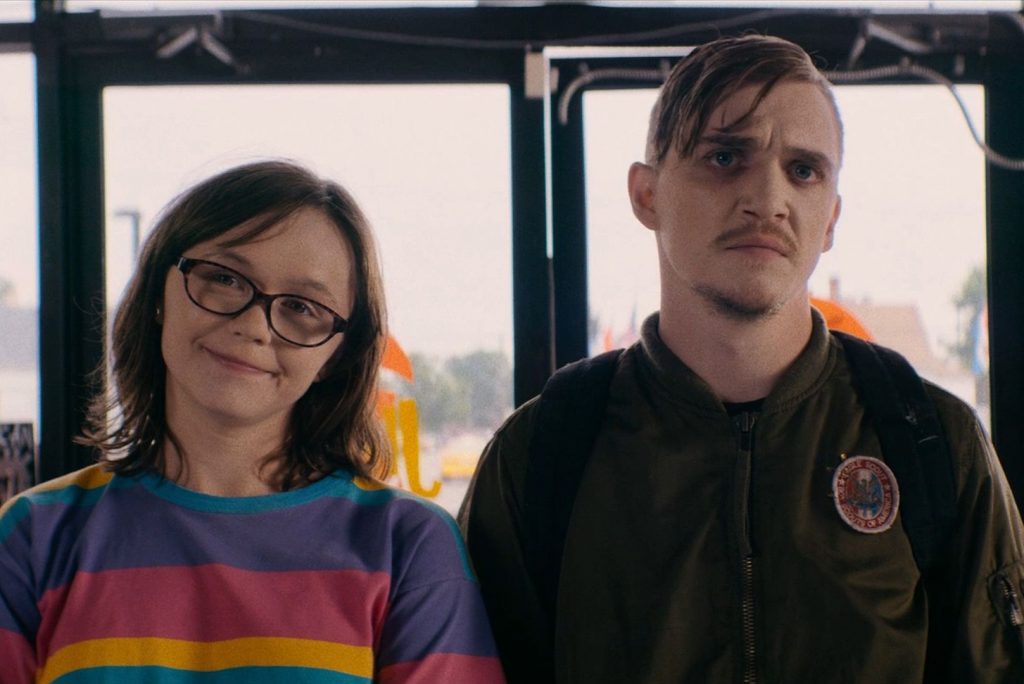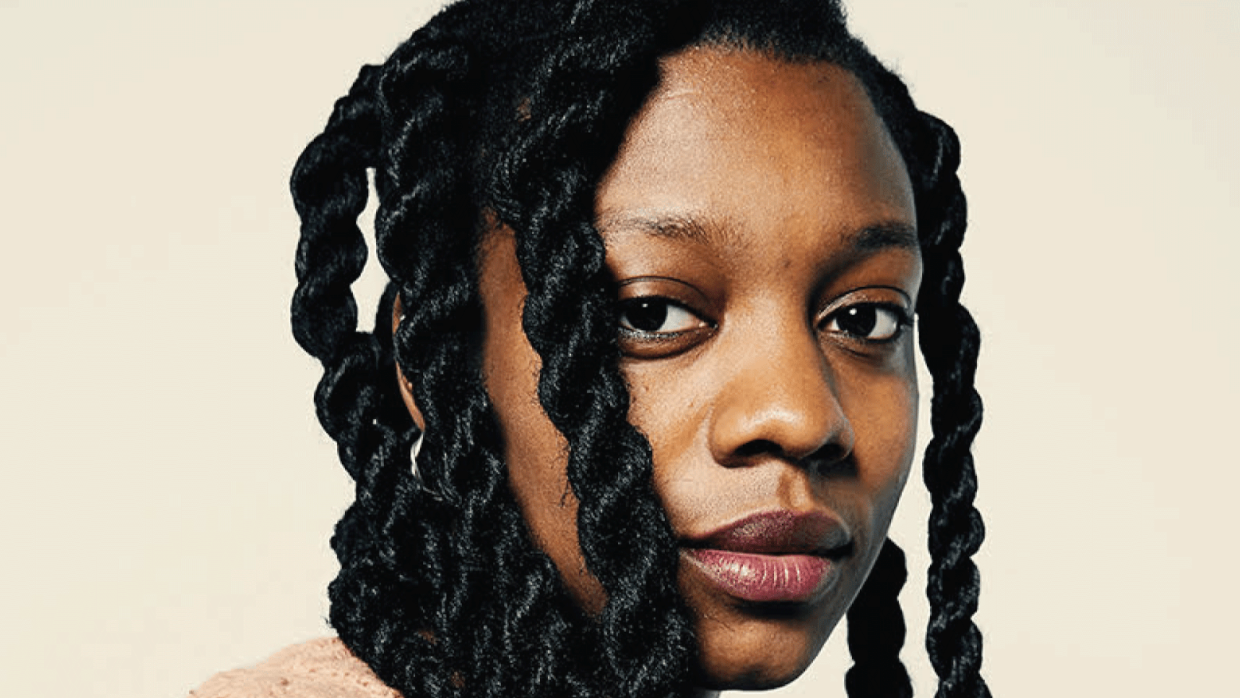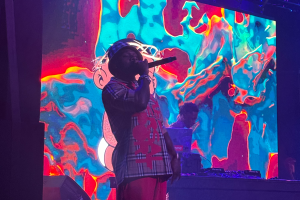Review: Nightstream festival finishes with frights
Review: Nightstream finishes strong

After a successful 4-day run, Nightstream Film Festival closed on Sunday evening, bringing more horror (and one comedy) films to fans. The final night featured films such as Dinner in America, Climate of the Hunter, Black Bear and Mandibles and one virtual Q&A session with filmmaker Nina DaCosta.
Dinner in America
Arson, provocative pictures, and introducing a midwestern family to marijuana’s relaxing properties hardly seems like a recipe for life-changing romance, yet for Simon and Patty, it is.
Set against the backdrop of monotonous suburban life, Dinner in America is the unanticipated love story between Simon (Kyle Gallner), an on the run and down on his luck punk rocker, and Patty (Emily Skeggs), a young woman who helps him evade the police and happens to be a groupie of his band.
Directed and written by Adam Reheimer, Dinner In America is a quirky and unconventional telling of the familiar coming of age rom-com. Reheimer crafts a narrative that, instead of feeling repetitive and contrived, feels fresh and boundary-pushing.
It features many typical tropes of the genre: Uncomfortable dinners with parents, angsty diner dinners, and a girl getting a makeover that changes her outlook and persona. But it is done in a way that feels authentic to the story and the characters within.
Patty and Simon find a connection and comfort in each other that they don’t have with anyone else in their lives; they are the only ones to stand up for one another. Patty brings out a different, more caring side, to the violent arsonist seen in the film’s first act. On the other hand, Simon helps Patty develop the confidence and backbone she so desperately needed.
After a secret concert turned police raid, Dinner In America leaves viewers surprisingly hopeful about Simon and Patty’s lives both together and apart, while also eager for a continuation of their story.
The actors bring a sincerity to these wildly messed up characters that ground the story while still bringing in moments of twisted comedy. Gallner leads the charge with an anti-hero portrayal that offers the audience a glimpse beyond the slur-hurling front Simon puts up.
Fitting in with the likes of Scott Pilgrim and Napoleon Dynamite, Dinner In America is an offbeat classic sure to be watched time and time again in film festivals and grungy basements across the country.
– Mackenzie Snell
Climate of the Hunter
Slip into the off-kilter world of sisters Alma, a free-spirited artist, and Elizabeth, a high-strung lawyer, as they welcome an old acquaintance back into their lives and vie for his affections over incredibly inedible Jell-O salads. Chock full of kooky characters and enough kitschy aesthetics to make your grandma jealous, Climate of the Hunter has fun with the vampire flick, a genre often filled with doom and gloom.
Alma and Elizabeth await the arrival of their childhood friend Wesley, now a debonair writer living in Paris, who appears with an air of mystery surrounding him. Through a series of tacky 1970s dinner parties and a revolving door of guests, tensions heighten between the three leads as Elizabeth gives in to her sexual desires and Alma battles her demons. Mickey Reece’s melodrama, overflowing with familial animosity and groovy character tropes, takes a Lynchian turn as Alma has visions of a supernatural force. Her paranoia blurs the lines between reality and illusion, and the film’s tendency to dance around the possible vampire in the room, leaves the audience and Alma without a solid answer.
Reece’s leading sisters play into nostalgic thriller tropes and push them a little bit further. Mary Buss is tightly wound as Elizabeth, with her beige lipstick and slicked-back hair, makes her appearance just as severe as her attitude. Ginger Gilmartin gives Alma, always on the cusp of her own nervous breakdown, an air of coolness akin to Stevie Nicks or Janis Joplin.
“You’re a goddamn vampire and you look fucking stupid,” Alma says during her confrontation with Wesley, wooden stake at the ready.
But Climate of the Hunter needs a little more punch and substance to make viewers root for these characters. Some of the supporting performances feel awkward and stiff, a possible stylistic choice that falls flat. A dialogue-heavy film, there are some things mentioned that go unexplored or fail to push the story forward. But mixed with instantly quotable lines like, “Thinking about pussy in his twilight years,” and, “That fart ruined my faith in God,” Reece’s film may have the makings of a future cult classic.
– Samantha Savery
Black Bear
“This has all been some kind of insane dream. And I think when we wake up tomorrow things are gonna look a lot different.”
Told in two acts, Lawrence Michael Levine’s Black Bear is a disorienting film-within-a-film featuring powerhouse performances from Aubrey Plaza, Christopher Abbott, and Sarah Gadon. With repetitive lines, shared costumes, and mirrored scenes, the film slowly exposes its connections to the audience—if only they’re paying attention.
The first act follows Plaza’s Allison, a filmmaker visiting a lakeside cabin to work on her next script. Blaire and Gabe, the owners of the cabin, are a couple completely unaware of how unhappy they are until their guest’s arrival. After an explosive discussion over dinner, tensions are high and keep building until the car crash of an ending.
Act two starts with Allison on the pier, reflecting an earlier scene while exposing her new role within this world. Now following the last day of filming an independent feature, Levine uses the second half of his film to explore the drama and trauma within relationships by focusing his scope on Gabe and Allison. Thrilling and exhausting, Black Bear never leads where the audience expects and rarely leaves time for you to catch your breath.
“What kind of movies do you like?” Gabe asks Allison early in the film. “Unsuccessful, small ones,” she retorts.
Black Bear is far from unsuccessful, thanks in part to its cast. Plaza is electric as she balances the dual realities of Allison, her performance in act two is gut-wrenchingly captivating. Digging her teeth into the role, she leads the audience along the film’s mind-boggling trip. Abbott quietly plays Gabe as the manipulative partner and makes him a believable, yet unknowing, antagonist. He has fun in the second half, reveling in the mind games his character plans to play. Gadon stays toe-to-toe with her costars as she brings Blaire, a woman in search of her own happiness, while trapped in her current situation to life. Coupled with Levine’s strong screenplay, the ferociously feral performances give Black Bear its bite.
– Samantha Savery
Mandibles
Who doesn’t love a good buddy-comedy? Think movies like Pineapple Express, Role Models, The Heat and Step Brothers — films where a pair of best friends take on the world with blunders and laughs. Mandibles, a film by French-Belgian director Quentin Dupieux, attempts to fit the buddy-comedy format, but doesn’t manage to pull many laughs.
Mandibles is the only comedy featured in Nightstream, a horror film fest. The presence of this movie in the line-up is confusing. It was not scary or funny, however, it might be a little freaky to think that anyone involved in this film actually thought it was worth making.
The movie follows two friends, Manu (Grégoire Ludig) and Jean Gab (David Marsais), as they travel in a worn-out stolen car. The catch? They found a giant fly in the trunk of the stolen car. The pair attempts to hide the fly as they end up in a vacation villa with a rich woman who mistakes Jean Gab for a high school friend. Their efforts in concealment lack humor, and the visual effects used to create the fly are quite cheesy.
It’s baffling that in 2020, someone decided that a giant fly would be funny. The jokes in the film fall flat, as they are almost all centered around this very fake-looking fly. This film could have taken the opportunity to make fun of itself, as Pineapple Express does, but it seems Dupieux actually thought this was legitimately funny. As far as buddy-comedies go, the only one this movie comes mildly close to in quality is the 2003 flop Kangaroo Jack.
Mandibles seems like something YouTuber Kurtis Conner would review on his channel — he’s roasted the likes of Neil Breen and Christian Mingle: The Movie. Movies that are too ridiculous to be taken seriously go to Kurtis’ channel, and that is certainly where Mandibles belongs.
– Sarah Connor
Virtual Fireside with Nia DaCosta

Director and screenwriter, Nia DaCosta joined Vulture staff writer, Hunter Harris, for a virtual fireside Q&A surrounding her upcoming film, Candyman.
In what looked like it occurred in a Zoom meeting, DaCosta discussed her childhood infatuation with horror films and how her rendition of the 1992 film of the same name came together. After being informed of the project by her agent, she pitched her ideas to Jordan Peele’s Monkeypaw Productions, who is responsible for producing the remake. She was able to add elements of body horror and visual allusions to the new version.
DaCosta made her directing debut with independent drama film, Little Woods, in 2018. With Candyman, her goal was to highlight and contextualize Candyman/Daniel Robitaille’s life story given the different time period in which it is being retold today.
“[Candyman] is literally a ghost or a vengeful spirit who is born out of racial violence,” DaCosta said. “He is a Black man who is lynched by a white lynch mob, and that is who he is. How do we take this individual moment for this character and see how it might have been repeated or how it might be part of a bigger history that we have in America?”
DaCosta mentioned the cyclical nature of racial violence against Black people and the collective grieving that occurs as a result. One of the ways in which we grieve, the director said, is through creating stories around what happened, which is essentially what Candyman is.
“We really wanted to create a horror film,” DaCosta said. “Something that was entertaining and scary, but also scary for the purpose of putting everyone into the shoes of the people who’ve been victimized and who are caught up in this wave of violence. Racial violence, in particular.”
She also touched on the state of Black horror, saying that the community is vast and is in existence because of the many Black directors who seek each other out.
Candyman was 2020’s highly anticipated Black horror film. However, due to the coronavirus pandemic, its release has been pushed back to 2021. In the meantime, fans can attempt to summon Candyman at home in the mirror. At your own risk, of course.
– Cydney Lee





